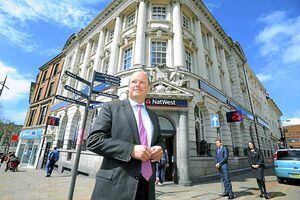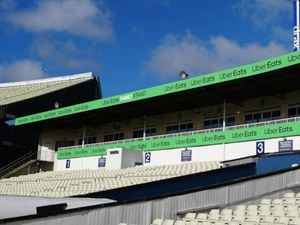'Back to basics' is key to beating recession says RBS boss
MORE?manufacturing, increased competition and a better-skilled workforce will help the West Midlands back on its feet after the recession, the chief executive of the Royal Bank of Scotland said.

Stephen Hester, who earns £1.2 million a year plus bonuses in charge of the 82 per cent state-owned bank, told an audience of business people in Wolverhampton that a back-to-basics approach was needed.
The banker said he wanted to see the Black Country and Staffordshire get back to the business of making things again so it can prosper. "We didn't make and do enough," he said. "We spent too much time on things like property.
Heartland
"The Midlands is the industrial heartland and it's in a more cheerful mood than for some years in terms of manufacturing.
"Companies have to become more competitive. Education has an important role to play.
"We won't be competitive with places like Indonesia if we have don't have skilled workers."
He was speaking at The Workspace in All Saints, Wolverhampton, after being invited by Wolverhampton South East MP Pat McFadden. Earlier yesterday he took a wander around Wolverhampton city centre, visiting NatWest in Queen Square, part of the RBS group.
Mr McFadden has been keen to make sure that RBS has Wolverhampton and the rest of the region on its radar and thought a meeting with city businesses would help.
Mr Hester revealed the bank has an 'embarrassment' of cash that it cannot lend because businesses are not seeking to borrow it – at a rate they can pay back at least. He spoke without a trace of the accent of his native North Yorkshire, where he was educated at a comprehensive school.
And in his suit, white shirt and pink tie he looked like any other banker as opposed to the well-heeled multi-millionaire pictured in some newspapers in full hunting gear on a horse.
Speaking to the Express & Star he disputed claims that banks are not willing to lend to businesses, and points out that RBS says yes 90 per cent of the time. The bigger issue is that at times of economic uncertainty the average company does not want to take on more debt," he said.
"More businesses are depositing money with us than are asking for loans."
Nonetheless, he hints that he believes recovery is coming even though the UK passed dangerously close to a triple dip recession.
"Things always look gloomy before recovery sets in," he said. "It happens once we've dealt with problems that happened in the first place. The UK is dealing with its problems."
Mr Hester was brought in to take charge of RBS after its £45 billion Government bailout. The bank is now 82 per cent owned by the taxpayer and the career banker has had to get used to being a public servant.
Gone are the days of his predecessor Fred 'the shred' Goodwin, who oversaw huge growth and cost cutting at RBS only to preside over its downfall and later be stripped of his knighthood.
Crisis
To many people the banking crisis with its sub prime lending and credit crunch seemed extremely complicated.
Mr Hester put it in very simple terms. He said: "The losses in banks across the world were overwhelmingly from bad loans. Someone made bad loan decisions."
He now wants the Government to get on with the business of selling shares in RBS so that it can be a private company once more.
"It can't come a day too soon for me," he said, thinking like a banker and seeing the potential it could have before slipping back into the role of public servant: "But it isn't in my gift. The Government decides when to privatise us."
And he said that there was no point in bankers "whingeing" about how people blame them for the financial problems of the country.
He said: "Their job is to fix the issues they were rightly criticised for.
"If we fix things there will be a time lag before people see it."





